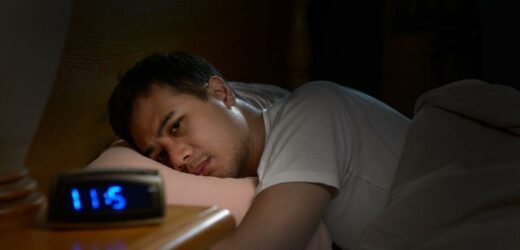This Morning: Dr Zoe describes benefits of napping
We use your sign-up to provide content in ways you’ve consented to and to improve our understanding of you. This may include adverts from us and 3rd parties based on our understanding. You can unsubscribe at any time. More info
This is the conclusion of a study of 4,003 UK adults commissioned by Direct Line Life Insurance as part of their “Need for Sleep” campaign. According to Direct Line, “the UK is sleepwalking into a health crisis, with 37 million people not getting the recommended seven-to-nine hours of sleep at night”. This warning was backed up by the results of their investigation, which found that 50 percent of adults — some 26.5 million people across the UK — report waking up feeling tired. Feeling insufficiently rested at the start of one’s day was also found to be more common among both shift workers and those working long office hours — affecting 61 and 57 percent, respectively, of each group.
The researchers found that the average nap of the UK adult lasts for 45 minutes, although 23 percent tend to doze off for more than an hour.
The length of nap taken appears to be correlated with age — with 18–24-year-olds tending to sleep for an average of 58 minutes when having a daytime snooze, compared to just 28 minutes for those over the age of 75.
While sleeping during the day is often associated with laziness, experts have determined that it can in fact help boost one’s immunity when sick, reduce stress levels and improve one’s mood, and also help us process information and our memories.
And according to neuroscientist Professor Matthew Walker of the Center for Sleep Science at the University of California, Berkeley, a study of the impact of traditional siestas on communities in Greece found that not napping led to a 37 percent increase risk of death from cardiovascular complications.


The “Need for Sleep” campaign is being conducted in partnership with clinical psychologist and founder of The Sleep Practice, Dr Holly Milling.
Dr Milling said: “Sleep health is something we need to pay more attention to as a nation.
“It’s interesting that whilst naps are often viewed negatively in the western world, more than half of UK adults take advantage of the benefits of a short sleep in the day.
“People nap for a whole range of reasons including to catch up on missed sleep, to boost immunity if we are sick, or simply to enjoy the process of resting and a brief sleep.

Dr Milling added: “Naps can also improve memory, attention and physical performance.
“For example, many of the professional athletes that I work with include napping as an essential tool in their sleep plan.
“Likewise, tired employees might find a short daytime nap can help them to become more alert and focused, and so potentially improve their performance and wellbeing at work.”
One trend that Dr Milling recommends trying out is the “nappuccino” — taking a 20-minute nap directly after having a cup of coffee — which can boost your alertness.
According to the expert, the nappuccino allows people to reap both the benefits of having a brief sleep and the additional alertness gained by a hit of caffeine.
DON’T MISS:
Royal Navy’s new £30bn nuke subs can launch 12 separate missiles [INSIGHT]
Solar storm warning: Earth set for ‘glancing blow’ in HOURS [REPORT]
Putin could drop tactical nuke on Ukraine TOMORROW [ANALYSIS]

Direct Line Life Insurance communications manager Vincent Guadagnino said: “Often there is shame associated with having a little mid-afternoon sleep.
“But it’s good to see that many people are taking time to nap and hopefully reaping the benefits that come with it.”
“Our ‘Need for Sleep’ campaign has really highlighted the importance getting enough sleep can have on our overall health.
“While it’s encouraging to see people are taking naps seriously, there is definitely work to be done to make this widely acceptable and persuade more people to listen to their body — and rest when needed.”
Direct Line isn’t the only firm promoting sleep research this week, however, a survey of 2,000 adults commissioned by furniture retailer DFS reported that 42 percent of Britons report being better able to cope with stress if they get a good night’s sleep.
Furthermore, 55 percent of respondents said that they find themselves in a better mood after a decent sleep — and 52 percent said that a good night’s rest made them feel more positive about the coming day.
Psychologist Dr David Lee of Sleep Unlimited said: “It is no surprise that sleep is considered crucial to managing stress. Mood, mental health, and sleep are inextricably linked.
“In our clinical work with patients, we take anybody with any sort of mental health problem and get them sleeping better.
“REM sleep helps us deal with the stresses and strains that we have experienced throughout the day — often, the people who are struggling with their mental health do not sleep well.
“In order to facilitate a good night’s sleep to aid your mental health, you need to identify the obstacles in your way.”
Source: Read Full Article


